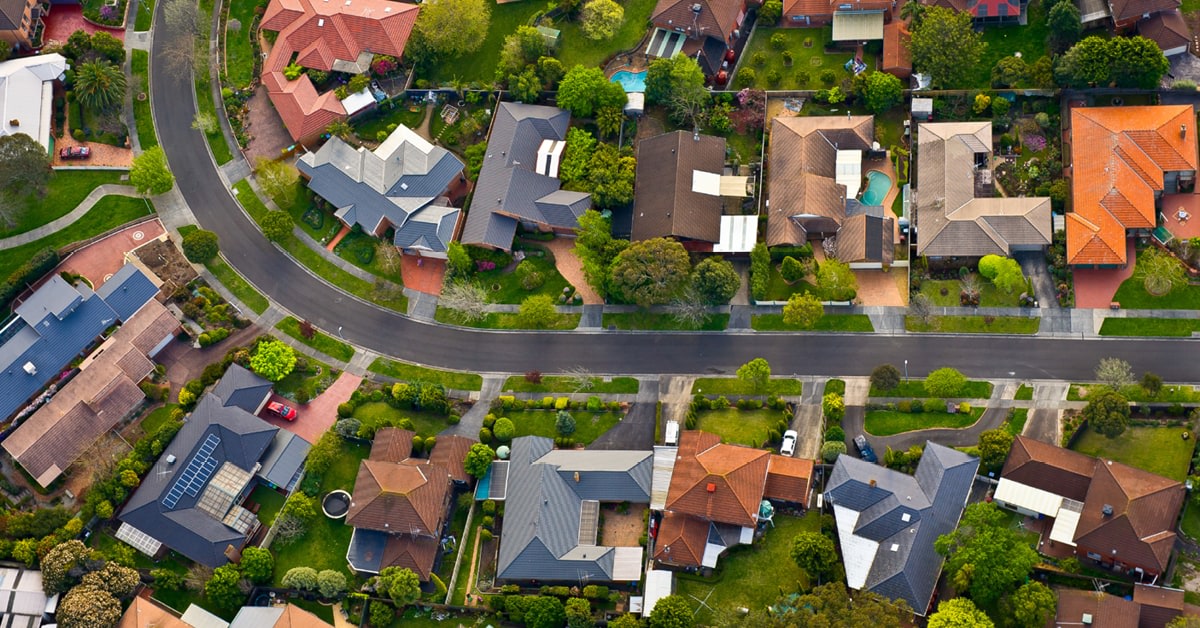8 Questions to Ask When Looking at Neighborhoods

Falling in love with a house is only half of the equation – it’s also important to fall in love with the neighborhood. You can find a home that seems perfect for you, but if the surrounding area doesn’t meet your needs or expectations, you may end up being dissatisfied. Be sure to ask yourself these questions to ensure you’ve found the right neighborhood before you buy a home.
How do the other homes in the neighborhood stack up?
Our favorite real estate agent once told us he’d rather have the worst house in the best neighborhood than have the best house in the worst neighborhood. Why? Your home’s value could be impacted by the surrounding homes in your neighborhood. For example, if you bought a home with every upgrade at a premium price, but the surrounding houses in the neighborhood are completely outdated, then your home’s value will be compared to those outdated properties when it comes time to sell. This means you likely won’t be able to sell your home for as much as you could if it were in a neighborhood where the other homes were similar to yours.
Does convenience matter to you?
While some individuals prefer to live in a more rural area, others find proximity to things like major interstates and plentiful shopping to be significant factors in their home buying decision. There are certainly pros and cons to both scenarios, so it’s important to decide what’s best for your family. With that said, if you intend to sell your home at some point, being convenient to highways and upscale shopping centers can positively impact the value of your home.
Are home values going up or down?
In general, neighborhoods with climbing home values indicate a good place to buy. For example, several towns where we live have annexed themselves from the county and now have their own school systems that are excellent. Because of that, home values in these towns have increased exponentially and continue to rise. New businesses that create new career opportunities can also lead to rising home values.
Does the neighborhood have an HOA?
Your stance on HOAs may impact your decision to buy a home, so it’s important to find out if one exists in the neighborhood. HOAs can certainly be beneficial, but sometimes the regulations are a bit much for some homeowners. One of the main goals of an HOA is to protect home values by implementing certain rules for maintaining the homes’ and the neighborhood’s appearance. This often comes with some additional perks like a community pool, a park, or nice walking trails. On the flip side, HOAs can be costly and rigid when it comes to what you can and can’t do with your home – so be sure to read the bylaws and think through your decision carefully before buying a home in a community with an HOA.
How highly rated are the local schools?
This is an especially important factor for families that will be sending their children to public school. You should be able to determine the school zone via the MLS listing, through your real estate agent or you can contact the local school district to learn more.
Generally speaking, where your home is located determines where your child will attend school.
If you aren’t pleased with the school’s reputation, you may want to look elsewhere for a home. On the other hand, if you plan to send your children to private school, the school zone where the house is located may not be a deal breaker at all.
Is the neighborhood walkable?
This could mean anything from having a local coffee shop around the corner to simply having sidewalks and parks that are easily accessible from your desired home. A good way to find out – aside from exploring the area on your own – is to visit WalkScore.com to find specific ratings for the neighborhood.
How many foreclosures and for rent signs do you see?
An abundance of foreclosures and rental signs can be cause for concern. A foreclosure here and there isn’t necessarily a bad thing, but if the neighborhood is full of them, it could be a red flag – as real estate prices fall, property taxes fall, which affects the quality of public services and safety. According to a a study done by the New York Times potentially reduce a home’s value by 1.3%, if within 300-500 feet away. It’s also a good idea to ensure the neighborhood has more owner-occupied homes than rental homes, since homeowners tend to care more about their home’s appearance – and a neighborhood filled with well cared for homes have a positive impact when you try to resell yours.
How safe is the neighborhood and surrounding area?
Let’s face it, no one really wants to live in a neighborhood that isn’t safe, but it can be hard to determine at first glance. It’s a good idea to research the crime rate online as well as talk to people in the neighborhood to get their perspective. When we moved to a new state, we were fortunate to have a few connections in the area and they were a huge help as we tried to determine the best neighborhoods in terms of safety. If we hadn’t asked anyone for help, we may have ended up in an area that was less than desirable. Many factors go into your home buying decision, and making sure the neighborhood is a good fit for you is an important one. Taking the time to research the area can pay off when it comes to finding the right home in the right neighborhood.